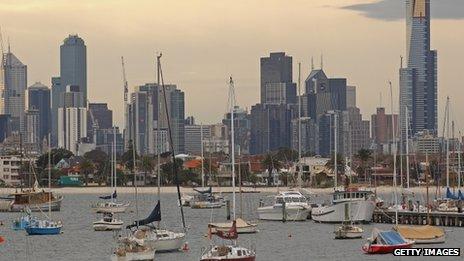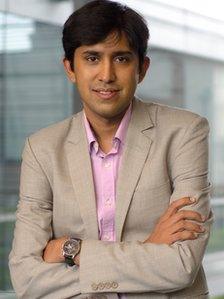India's Australian dream
- Published

Many Indians go to Australia attracted by its great lifestyle
India has surged ahead of China and Britain as the largest source of settlers to Australia, but can skilled migrants from the sub-continent forever resist the magnetic appeal of their homeland?
Many are students who are seduced by one of the world's great "lifestyle powers" and go on to thrive under the cobalt skies of their adopted homeland.
The latest figures show that 29,000 Indians, most of them qualified professionals, including software engineers and cooks, became permanent residents in Australia, which is more than 15% of the total intake according to the 2011-12 Migration Programme report.
But homesickness and a hankering for familiar haunts and faces can be unsettling for both new and old arrivals.
"There is something unique about India and even though it is a difficult country and you want to probably work elsewhere, there is something about the richness of Indian culture and the affection of the people around you which keeps pulling you back," said Professor Amitabh Mattoo, the Kashmiri-born director of the Australia-India Institute at the University of Melbourne.
"Of course, then there is also nostalgia, which can often make you dream about things that probably didn't exist," he added.
Indian culture
Raman Bhalla, from the Hindu Council of Australia, arrived in search of a better career and a higher standard of living in 2000 as Sydney enjoyed its Olympic glow.
Now with a family and a successful job, he concedes that one day when his children are older, the lure of building a business back in India could be impossible to ignore.
"I do call myself Australian first now, but I do have a strong association with Indian culture," the 37-year-old chartered accountant told the BBC.
"In a way I do feel guilty about leaving India, but even though I am here I can still contribute to India and possibly one day I'll even be able to go back."
"India is a fascinating country; the culture, the experience and the people, and you always feel you belong to the country. I can never imagine getting away from that feeling," he added.
Clearly, many migrants down under will never return to live in India.

Ruchir Punjabi says 'you can take the Indian out of India but you can't take India out of the Indian'
The diaspora here is growing and increasingly confident and concerns about racism, that surfaced during an ugly spate of attacks on Indian students in Melbourne and Sydney in 2009-10, have subsided.
Ana Tiwary, a filmmaker in her early 30s who lives in Sydney, moved to the city from the United States to be with her Australian-born husband in 2007.
"India is quite irresistible with the rising economy and a lot of Western countries seem stagnant in comparison to the fast pace of India," she explained.
"I have lived in many different countries over the years, so I do not crave India to the extent of wanting to return, but I would like to spend several months each year in India.
"There is so much to learn, experience and do in India that no other country has to offer. But in the past six years, I have started to feel an emotional connection with life in Australia," said Ms Tiwary.
'Curry and cricket'
While some are setting down deeper roots, other migrants are itching to try their luck back home as India rises.
"India is at the cusp of evolution as a country that is attractive to a lot of people," said Ruchir Punjabi, a website entrepreneur with offices in Sydney and Bangalore.
"The cliched saying "you can take the Indian out of India but you can't take India out of the Indians" holds true and that is also partly why people want to go back and be comfortable around the environment they grew up in," added the young businessman from Ahmedabad.
Asked if or when he would make the move back home, Ruchir said simply: "There's a very good chance it might be sooner than I realise."
Professor Mattoo believes that the flow of people between two nations that reach out into the Indian Ocean will increase because they have mutual values.
"If you look at the two countries you see how much they have in common beyond the usual stereotypes and cliches of the Commonwealth, curry and cricket. These are both multicultural, federal democracies, which have an interest in stability in Asia," he said.
- Published20 July 2012
- Published22 December 2011